Search results for 'rita banerjee'
-

Kaler Dorpone (Samaj, Itihas,Sanskriti) Interview: Sobhanlal Datta Gupta Edited By: Rita Banerjee & Arindam Dutta
Author: Edited By: Rita Banerjee & Arindam Dutta
₹275.00সমাজমনস্ক বাঙালির কাছে শোভনলাল দত্তগুপ্ত একটি অতি পরিচিত নাম। প্রাবন্ধিক, মার্কসীয় তত্ত্বের বিশেষজ্ঞ, সমাজচিন্তক হিসেবে তাঁর সামগ্রিক ভাবনাচিন্তাকে কালের দর্পণে: সমাজ, ইতিহাস, সংস্কৃতি শীর্ষক এই সাক্ষাৎকারে তুলে ধরা হয়েছে। শৈশব থেকে বর্তমান সময় পর্যন্ত সাতটি দশক জুড়ে এই কালপর্বের প্রথম ভাগে আছে তাঁর ব্যক্তি জীবন, তাঁর ছোটবেলা, ছাত্রজীবন, শিক্ষকতা ও গবেষণার কথা। দ্বিতীয় পর্বটি বিষয়ভিত্তিক: রাজনৈতিক তত্ত্ব, মার্কসবাদ, উত্তর -আধুনিকতা, বামপন্থার সংকট, ধর্ম, চলচ্চিত্র, সঙ্গীত ইত্যাদি। শোভনলাল দত্তগুপ্ত-র দার্শনিক চিন্তার বৃহৎ প্রেক্ষিতের একটি রূপরেখা উঠে এসেছে এই সাক্ষাৎকারে যা পাঠককে সাহায্য করবে তাঁর বিভিন্ন লেখাপত্র পড়া ও বোঝার ক্ষেত্রে। Learn More -
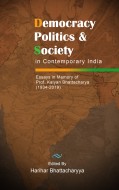
Democracy, Politics and Society in Contemporary India
Author: Edited by Professor Harihar Bhattacharyya, PhD (LSE)
₹700.00More people live with electoral democracy in India than in Europe and the US combined. If we are to understand democracy as a form of government, with its successes and failures, its ability to create peace and development or its ability to falter, create division and give rise to majoritarianism, authoritarian leaders or identitarian movements, we need to understand democracy in India. This intellectually engaging collection of articles is a valued contribution to this endeavour because it challenges us to investigate democracy as an ongoing process, its final goal never defined. The collection has profound lessons not just for understanding India’s democracy but for democracy, political legitimacy and societal capacity world-wide. Arild Engelsen Ruud University of Oslo Contents Preface and acknowledgments List of Tables List of Figures Notes on Contributors Harihar Bhattacharyya: Introduction: Democracy, More Questions, Few Answers Chapter 1 Subrata K Mitra: Citizenship in India: the puzzling resilience of an imported concept Chapter 2 Sudipta Kaviraj: Two Concepts of Democracy and the Left in West Bengal Chapter 3 Sobhanlal Datta Gupta: Revisioning the Left in today's India : Towards an alternative understanding Chapter 4 Surajit Ch. Mukhopadhyay: The Right and the Left: Contemporary India and the crises in Indian Democracy Chapter 5 Kaushik Bhattacharya: Independent Candidates in Lok Sabha Elections Chapter 6 Sumantra Bhattacharya: Political Marketing in India: How Political Parties in India Make Use of the Marketing Tools Chapter 7 Sukanta Bhattacharyya: Limits of Positive Discrimination in India’s Localities: Does it signal a failure of India’s Democracy? Chapter 8 Bibhas Bagchi: For a Radical Democracy: Understanding and Contesting Hierarchies in India Chapter 9 Syeda Layla Khaled: Muslim Women in India: Between Democratic Citizenship and Muslim Identity Chapter 10 Abhisek Karmakar: The Making of India’s Democracy Discourse: Contributions of Dwarakanath Vidyabhusan Chapter 11 Sahon Bhattacharyya:Reappraising the value of the traditional: Indian social ontology beyond the Western episteme Chapter 12 Joyjit Ghosh: Symptomatic Politics, Asymptomatic Media in India Chapter 13 Harihar Bhattacharyya: Indian Democracy’s Civil and Political Society: A critique of Partha Chatterjee Appendices 1. Jyotirmay Bhattacharya: A short Biography of late Kalyan K Bhattacharya 2. Kalyani Bhattacharyya: Kalyan Bhattacharya: A Reminiscence 3. Writings of Kalyan Bhattacharyya: (re-reprinted) a. Sociology of Inequalities: Bankim Chandra’s Essay on Samya (1992) (pp. 85-107) Journal of Socio-Political Studies, Vol 1, 1992. b. Bhudev and Modernity: Nationalism and Beyond (2007) (pp. 30-45) Index Learn More -
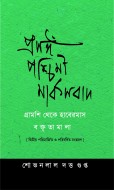
Prasanga Paschimi Marxbad: Boktritamala Gramsci theke Habermas- Second Enlarged Edition
Author: Sobhanlal Datta Gupta
₹250.00বইটির প্রথম সংস্করণে (২০২০) ছয়টি বক্তৃতার মাধ্যমে পশ্চিমী মার্কসবাদের স্বরূপ, গ্রামশি, লুকাচ, কর্শ, ফ্রাংকফুর্ট স্কুল এবং হাবেরমাসের তত্ত্বগুলি নির্বাচিত গ্রন্থতালিকা সহ পরিবেশিত হয়েছিল । দ্বিতীয় সংস্করণে (২০২২) পশ্চিমী মার্কসবাদের স্বরূপ, গ্রামশি এবং ফ্রাংকফুর্ট স্কুল বিষয়ক বক্তৃতাগুলির আমূল পরিমার্জন ও পরিবর্ধন করা হয়েছে I প্রয়োজনীয় পরিমার্জন করা হয়েছে অন্য বক্তৃতাগুলির ক্ষেত্রেও I নির্বাচিত গ্রন্থতালিকাতে বেশ কিছু নতুন বই-এর অন্তর্ভুক্তি ঘটেছে । Learn More -
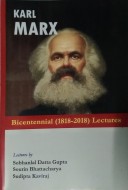
Karl Marx-Bicentennial (1818-2018) Lectures
Author: Sobhanlal Dutta Gupta, Sourin Bhattacharya, Sudipta Kaviraj
₹90.00First Lecture- Exploring Marx in the Post-Soviet Era: New Frontiers, New Perspectives- by Sobhanlal Datta Gupta. Former Surendra Nath Banerjee Professor of Political Science, University of Calcutta. Second Lecture- Capital:Nature of the Text Its Implication for the Present- by Sourin Bhattacharya Former Professor of Economics, Jadavpur University Third Lecture- Marx's Truth: A Historical Reading of his Thought- by Sudipta Kaviraj Professor Department of Middle Eastern, South Asian and African Studies- Columbia University Learn More -

RE READING RAMMOHUN ROY: A TWENTIETH CENTURY PERSPECTIVEE
Author: Editor: Partha Pratim Basu
₹200.00CONTENTS 1. RadharamanChakrabarty : Re-Visiting the Raja. 2. SobhanlalDatta Gupta, Rammohun Roy and his Quest for Modernity: Revisiting his Interpreters 3. ParthaPratimBasu, Rammohun Roy: A Path breaking Inquiry into the Colonial Economy 4. ShibashisChatterjee and RudrasekharBasu, The Domestic and the ‘Global’: The Dual Registers of Rammohun’s Liberalism 5. ImankalyanLahiri and ParthaPratimBasu, Rammohun Roy and the Unitarians: An Enduring Connect 6. Parikshit Thakur, Re-viewing Rammohun Roy’s Idea of Tolerance Editor: Partha Pratim Basu Contributors RadharamanChakrabarty: Former Vice chancellor, NetajiSubhas Open University, Kolkata SobhanlalDatta Gupta, Former Surendranath Banerjee Professor of Political Science, University of Calcutta ParthaPratimBasu, Professor of International Relations, Jadavpur University ShibashisChatterjee, Professor of International Relations, Jadavpur University ImankalyanLahiri, Associate Professor of International Relations, Jadavpur University RudrasekharBasu, Assistant Professor of Political Science, Chapra Govt. College, Nadia, West Bengal Parikshit Thakur, Assistant Professor of Political Science, Dwijendralal College, Krishnanagar, West Bengal Learn More -
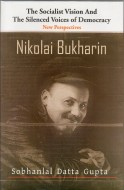
The Socialist Vision and the Silenced Voices of Democracy- New Perspectives- Nikolai Bukharin
Author: Sobhanlal Datta Gupta
₹495.00About the Author:
SobhanlalDatta Gupta (1948), former SurendraNath Banerjee Professor of Political Science, University of Calcutta, has an abiding interest in the political and intellectual history of Marxism. Some of his recentworks include Comintern and the Destiny of Communism in India: Dialectics of Real and a Possible History (Kolkata: Seribaan, 2006; revised and enlarged edition in 2011)[A Malayalam version published in 2010 and a German version in 2013], The Ryutin Platform(Stalin and the Crisis of Proletarian Dictatorship) (ed.) (Kolkata: Seribaan 2010), Marxism in Dark Times: Select Essays for the New Century (Delhi, London, New York:Anthem Press, 2012) and The Socialist Vision and the Silenced Voices of Democracy. Part I :Rosa Luxemburg (Kolkata:Seribaan, 2015).
Learn More -
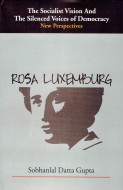
The Socialist Vision And The Silenced Voices of Democracy- New Perspectives - : ROSA LUXEMBURG
Author: Sobhanlal Datta Gupta
₹495.00Rosa Luxemburg whom Franz Mehring called “the best brain after Marx in socialist movement” after the death of Marx remained protractedly maligned for over half a century by Josef Stalin and his sidekicks in the Russian Social Democratic Labour Party — subsequently rechristened as the Communist Party of Soviet Union (Bolshevik) and thereafter CPSU — was the ‘ideologue’ of “Luxemburgism” and counter-revolutionary strain of Menshevism. Dr William A Pelz blasted “Luxemburgism “ as “clumsy, cynical and self- serving parody on the ideas of Rosa Luxemburg” at the International Rosa Luxemburg Conference — Internationale Rosa-Luxemburg-Gesellschaft (IRLS) — in Tokyo (April 2007). It was the sixth such conference. The first such meet took place in Chicago in 1998. Last year, Seoul was the venue of the IRLC which is organised by the International Rosa Luxemburg Society (IRLS) that aims at demolition of tendentious ‘Luxemburgism’ and restoration of theoretical and practical struggle, initiated by Luxemburg. The rediscovery of Luxemburg — Another Luxemburgism is possible: Reflections on Rosa and the Radical Socialist Project, the title of Dr Pelz’s paper — could be congenial after the fall of ‘Official Marxism’ (sadly with the fall of Soviet Union). Dr Sobhanlal Datta Gupta, formerly Surendranath Banerjee Chair of political science, University of Calcutta, who has attended every IRLS since 1998 and an internationally reputed research scholar on the international communist movement, has done yet another commendable work, The Socialist Vision and The Silenced Voices of Democracy — New Perspectives — Part I, Rosa Luxemburg (Seriban, Bakhrahat, South 24 Parganas district, West Bengal, Rs495), a 137-page book, packed with reference to source materials which will help scholars engaged in research on Luxemburg. Gupta is at work for the next two books under this series: one on Nikolai Bukharin and another on György Lukács. “Freedom” Luxemburg wrote famously in the Marxian spirit, “is always the freedom of those who think differently”. Unlike Bolsheviks, including Lenin, she had stuck unflinchingly to the ‘Hegelian-Marxian’ trait in contrast to ‘ultra-centralism’ of RSDLP, the ruling party (after the Bolshevik Revolution) under Lenin. She did her best to rid ‘Marxism’ or Marxian temper of what Robert Locker described as ‘organisational fetishism’, leading to ossification of the RSDLP due to ‘purely mechanistic fashion’ of running the party and the governmental power during Lenin’s lifetime. Luxemburg was compelled to criticise Lenin’s (Trotsky’s too) ‘organisational centralism’. She differed profoundly with Lenin’s aberrant experiment of vanguard role of the party that Marx never prescribed. Gupta’s advantage was his almost six month research at the archive of the Communist International (Third International or Comintern) in Moscow after it was declassified during the last years of Gorbachev era. He published a seminal work, Comintern and the Destiny of Communism in India — Dialectics of Real and Possible History, which was translated into German and Malayalam. The present treatise is split into six sequentially built chapters: New Historiography, Vision of Socialism and Democracy and Spontaneity contra Centralism of Luxemburg, Internationalism of Communism and Destiny of Rosa Luxemburg and Rosa Luxemburg and the World Today. His identification of Rosa as ‘ a heretic, a revolutionary with a difference and so remained a constant threat to all those who felt it safe not to question the claims of official Marxism’ guides a reader to understand the meaning of Dr Pelz’s paper ‘Another Luxemburgism is possible’. Her real name was Rozalia Luksenburg, born in 1871, into a Polish family of secular Jews in a small city in Russian-occupied Poland. How brutally she was killed on January 15, 1919, as a sequel to the abortive bid of her party Independent Socialist Party of Germany (USPD) to overthrow the Ebert-Scheidemann government is well known. Stalin embarked on abusive vilification of her theoretical contributions 12 years thereafter through his infamous letter ‘On Some Questions Concerning the History of Bolshevism’, published in Proletarskaia Revoliutsiia (1931). He blamed Rosa for ‘counterrevolutionary Menshevism’, a tendentious accusation. Instantaneously, Leon Trotsky, Stalin’s enemy number one, lashed out at him with a sharp polemical essay, Hands off Rosa Luxemburg. The wilful abuse against Luxemburg remained unchanged even after the Stalin period. Which was why Annelies Laschitza, the outstanding biographer of Luxemburg, had to submit the manuscript within the bureaucratic frame, set out by the central committee of erstwhile Socialist Unity Party of now-defunct German Democratic Republic, although she and Gunter Radczuan jointly headed the project for Rosa’s biography. “From her own testimony it is now evident that there were vast gaps, distortions, if not falsifications, in the name of Leninism”, noted Gupta. Laschitza’s keynote address, Encountering Rosa Luxemburg-Past and Present, at a symposium, organised by the Berlin-based Institute of History of Working Class in March 1989 is ‘a fascinating analysis’, he adds. Laschitza criticised Lenin for loose comments on the great revolutionary in his Notes of a Publicist’( November 1922), ‘without actually reading it’. Gupta’s paper Understanding Socialism as Hegemony: Rosa Luxemburg and Nikolai Bukharin at the Tokyo conference of IRLS (2007) is an original contribution. Bukharin was closer to Luxemburg than Antonio Gramsci and György Lukács, Gupta observed. Bukharin wrote poignantly: “A static and tranquillised attitude is a trait that grows out of parasitism… The active and creative quality of socialist culture results in an ever-renewed growth of both material and spiritual needs, in which the latter develop into actual passions”. Bukharin thought of ‘new man’ in socialist or communist society like Rosa. Official Marxism never thought alike. However, the new revelations about Luxemberg are mostly in German. Out of her 900-plus letters, edited by Laschitza, Georg Adler and, Peter Hudis, less than 250 have been translated into English. We hope IRLS will look into the matter. Learn More -

The Moments of Bengal Partition : Selections from the Amrita Bazar Patrika 1947-1948
Author: Arun Ghosh
₹995.00Arun Ghosh, founder librarian of Centre for Studies in Social Sciences, Calcutta ( Kolkata), has been engaged in painstaking research for several years on the Partition of Bengal in 1947 and its aftermath. In the present volume, he offers a contemporary record of the event in the form of a selection of news items, editorial articles and comments, letters to the editor, etc, that appeared in the Amrita Bazar Patrika, the foremost “ nationalist” daily of the time, in the nineteen months from immediately before the Partition to after, till November 1948. The selections offer insights into the positions taken by political parties and leaders as well as the reactions of the people directly affected by the Partition, leading to the massive displacement of people and their plight, a fragment of history rarely studied at such close quarters. Accessed from fast decaying material stored mostly in poorly maintained archives, the documents gathered here should serve as invaluable resources for fresh studies of the Partition. Learn More -
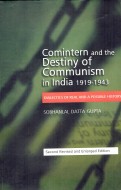
Comintern and the Destiny of Communism in India 1919-1943
Author: Sobhanlal Datta Gupta
₹895.00After the opening of Moscow's Comintern archives and the archives of the Communist Party of Great Britain in the 1990s, this is the first full length study of the impact of the Communist International ( Comintern) on the shaping of Indian communism. Based on materials collected from these once forbidden archives, the book also takes into consideration the private papers of Horst Krueger in Berlin, a whole range of inner- party documents and the new Comintern historiography ( primarily Russian and German, apart from English) that has developed over the years. The book is the culmination of the author's research for more than a decade on the shaping of communism in India in the Comintern period. The Present edition of the book incorporates many new materials which have come to the surface since the publication of the first edition in 2006 and also introduces a comparative perspective, highlighting how communism developed in the countries of the East, and examines how the path chosen by the Indian communists was so different from that of the Communist Parties in China, Vietnam, Indonesia and Korea, for example. A Malayalam version of the first edition of the book, was published in 2010. A German version of the present revised and enlarged edition was published in 2012. Learn More

